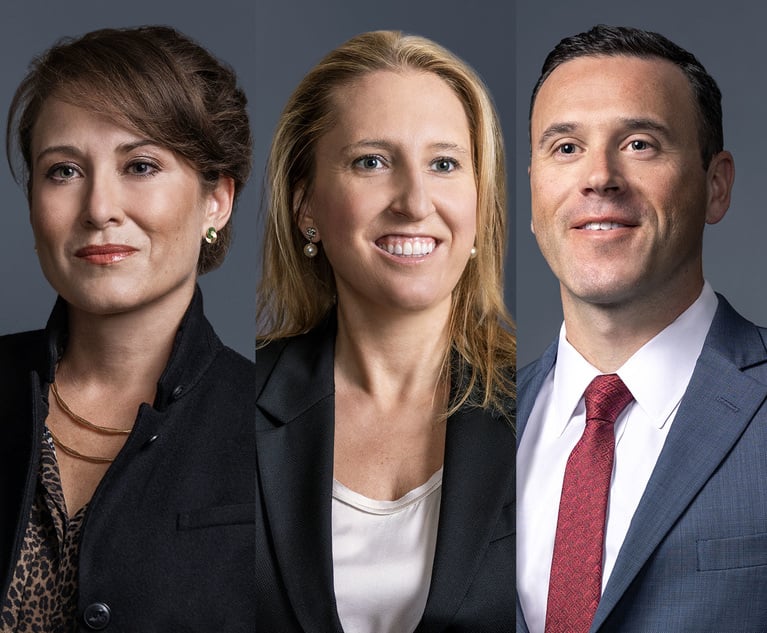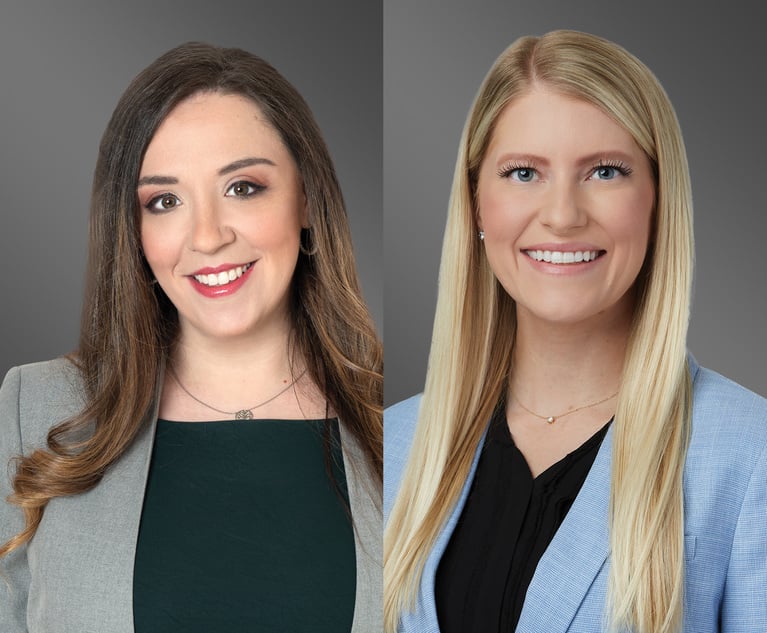How to Become a Data-Driven Legal Team
In-house legal teams are increasingly using data analytics for a variety of tasks, and nearly all surveyed agreed that analytics will play a crucial role in the future of the services they provide to their organizations. But what does this really mean?
November 05, 2018 at 07:01 PM
5 minute read
 SimpleLegal CEO Nathan Wenzel.
SimpleLegal CEO Nathan Wenzel.
“Data-driven” is the new buzzword. According to a Coalition of Technology Resources for Lawyers Survey, in-house legal teams are increasingly using data analytics for a variety of tasks, and nearly all surveyed agreed that analytics will play a crucial role in the future of the services they provide to their organizations. But what does this really mean? What data needs to be collected in order to achieve departmental and business outcomes? More importantly, what does it take to be a truly data-driven legal department?
A Timely Opportunity for Legal Tech
Legal teams have the opportunity to embrace the data-driven mentality by leveraging legal technology such as e-Billing and matter management software. This technology provides insights that legal teams can leverage to more accurately make key expense predictions, grow teams in the right ways at the right times, and drive rate negotiations with outside counsel. Such insights can also help legal teams communicate more effectively with other department leaders, such as heads of marketing, sales or engineering.
With the 2017 CLOC State of the Industry Survey reporting that over 80 percent of the consortium members surveyed already use an e-billing solution, it's encouraging that legal departments are proactively looking to be more quantitative and are positioning themselves for success. To better understand how this data can be used to positively impact business objectives, here are three best practices for using metrics to foster an effective, data-driven culture:
1. Determine Your Primary Goals
The truth is, technology (and the data it collects and analyzes) is only helpful when organizations have a thorough understanding of the goals the technology is going to help achieve. One of the more common problems that today's legal leaders are trying to solve for is “the scarcity of attention.” Corporate attorneys have a lot on their plate which spreads their attention across multiple projects. Technology can automate tasks and other administrative activities that vie for their attention, allowing them to focus on high-quality, high-impact legal work.
With that in mind, it's important not to get caught up in the widespread data-driven momentum and identify your primary goals. For some, reducing and controlling spend might be the main objective. Others may need to focus on improving the efficiency and quality of their work, boosting outside counsel productivity or driving in-house team growth. If you're having difficulty identifying your primary goals, ask your General Counsel for their primary objectives, and then follow up by reviewing the goals of the broader organization. If you're able to define your true north, you can then measure all other goals against that broader context.
A good first step once you've determined your primary goal(s) is to build a 'current state' picture. For instance, you can categorize spend by matter, practice area or company to get a quantitative look at spend today.
2. Select Key Metrics
Once you've organized your data and have goals in place, the next step is to select the key metrics related to your goals. Be sure to focus only on what is most important to your team and incorporate metrics you can actually measure. For example, if your main objective is to reduce legal expenses, only tracking the efficiency of your outside counsel isn't going to be very helpful. Instead, you'll need to zero in on metrics such as:
- Total legal spend year over year
- Top 10 matter types by spend
- Timekeeper rate comparisons
- Monthly spend by matter type
- Department spend vs. budget
3. Visualize the Data
Data is only valuable if it's actionable. It's essential that data isn't just a slew of numbers and words, half-heartedly organized in a static spreadsheet. Focus on the data that's most important to you, organize it, and maintain that organization in a way that makes the most sense for your team. This way, it will be easier to spot trends over time which will influence how you manage budgets and allow you to more accurately forecast for future litigation and high-impact projects.
Again, this is where e-Billing and matter management technology can come into play. By giving you access to valuable reports in just a few clicks, you can avoid weeks pulling together PDF and paper files and keying numbers into Excel—a time-consuming process that is highly-error prone. With access to immediately actionable and visual insights, legal teams can make more informed business decisions that allow the department to be proactive instead of simply reacting to business needs after the fact.
Capitalize on Data
Technology offers the potential to collect a wide spectrum of data points, but that doesn't mean each of those data points is of equal importance. Apply a strategic approach to data collection and ensure you have a clear understanding of why certain technologies have been adopted and how they stand to facilitate improved outcomes. There's no reason to wait. Capitalize on the wealth of data you have at your fingertips.
Nathan Wenzel co-founded SimpleLegal as an eBilling and matter management software to bring a data-driven approach to how legal operations departments manage budgets and outside legal counsel. At SimpleLegal, Nathan leads company strategy, product direction and adoption. He manages client relationships with companies ranging in size from new startups to global, public, multi-billion dollar corporations.
This content has been archived. It is available through our partners, LexisNexis® and Bloomberg Law.
To view this content, please continue to their sites.
Not a Lexis Subscriber?
Subscribe Now
Not a Bloomberg Law Subscriber?
Subscribe Now
NOT FOR REPRINT
© 2025 ALM Global, LLC, All Rights Reserved. Request academic re-use from www.copyright.com. All other uses, submit a request to [email protected]. For more information visit Asset & Logo Licensing.
You Might Like
View All
M&A Transactions and AB 1824: Navigating New Privacy Compliance Challenges
7 minute read
What Will It Mean in California if New Federal Anti-SLAPP Legislation Passes?
9 minute read
Courts Demonstrate Growing Willingness to Sanction Courtroom Misuse of AI
4 minute read
For Growing Law Firms, Customizable Financing Can Unlock Opportunities
6 minute readTrending Stories
- 1Trump's DOJ Files Lawsuit Seeking to Block $14B Tech Merger
- 2'No Retributive Actions,' Kash Patel Pledges if Confirmed to FBI
- 3Justice Department Sues to Block $14 Billion Juniper Buyout by Hewlett Packard Enterprise
- 4A Texas Lawyer Just Rose to the Trump Administration
- 5Hogan Lovells Hires White & Case Corporate and Finance Team in Italy
Who Got The Work
J. Brugh Lower of Gibbons has entered an appearance for industrial equipment supplier Devco Corporation in a pending trademark infringement lawsuit. The suit, accusing the defendant of selling knock-off Graco products, was filed Dec. 18 in New Jersey District Court by Rivkin Radler on behalf of Graco Inc. and Graco Minnesota. The case, assigned to U.S. District Judge Zahid N. Quraishi, is 3:24-cv-11294, Graco Inc. et al v. Devco Corporation.
Who Got The Work
Rebecca Maller-Stein and Kent A. Yalowitz of Arnold & Porter Kaye Scholer have entered their appearances for Hanaco Venture Capital and its executives, Lior Prosor and David Frankel, in a pending securities lawsuit. The action, filed on Dec. 24 in New York Southern District Court by Zell, Aron & Co. on behalf of Goldeneye Advisors, accuses the defendants of negligently and fraudulently managing the plaintiff's $1 million investment. The case, assigned to U.S. District Judge Vernon S. Broderick, is 1:24-cv-09918, Goldeneye Advisors, LLC v. Hanaco Venture Capital, Ltd. et al.
Who Got The Work
Attorneys from A&O Shearman has stepped in as defense counsel for Toronto-Dominion Bank and other defendants in a pending securities class action. The suit, filed Dec. 11 in New York Southern District Court by Bleichmar Fonti & Auld, accuses the defendants of concealing the bank's 'pervasive' deficiencies in regards to its compliance with the Bank Secrecy Act and the quality of its anti-money laundering controls. The case, assigned to U.S. District Judge Arun Subramanian, is 1:24-cv-09445, Gonzalez v. The Toronto-Dominion Bank et al.
Who Got The Work
Crown Castle International, a Pennsylvania company providing shared communications infrastructure, has turned to Luke D. Wolf of Gordon Rees Scully Mansukhani to fend off a pending breach-of-contract lawsuit. The court action, filed Nov. 25 in Michigan Eastern District Court by Hooper Hathaway PC on behalf of The Town Residences LLC, accuses Crown Castle of failing to transfer approximately $30,000 in utility payments from T-Mobile in breach of a roof-top lease and assignment agreement. The case, assigned to U.S. District Judge Susan K. Declercq, is 2:24-cv-13131, The Town Residences LLC v. T-Mobile US, Inc. et al.
Who Got The Work
Wilfred P. Coronato and Daniel M. Schwartz of McCarter & English have stepped in as defense counsel to Electrolux Home Products Inc. in a pending product liability lawsuit. The court action, filed Nov. 26 in New York Eastern District Court by Poulos Lopiccolo PC and Nagel Rice LLP on behalf of David Stern, alleges that the defendant's refrigerators’ drawers and shelving repeatedly break and fall apart within months after purchase. The case, assigned to U.S. District Judge Joan M. Azrack, is 2:24-cv-08204, Stern v. Electrolux Home Products, Inc.
Featured Firms
Law Offices of Gary Martin Hays & Associates, P.C.
(470) 294-1674
Law Offices of Mark E. Salomone
(857) 444-6468
Smith & Hassler
(713) 739-1250






